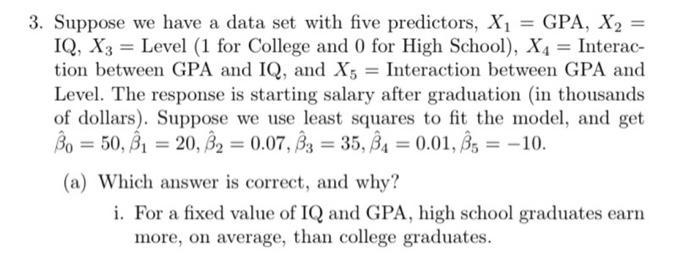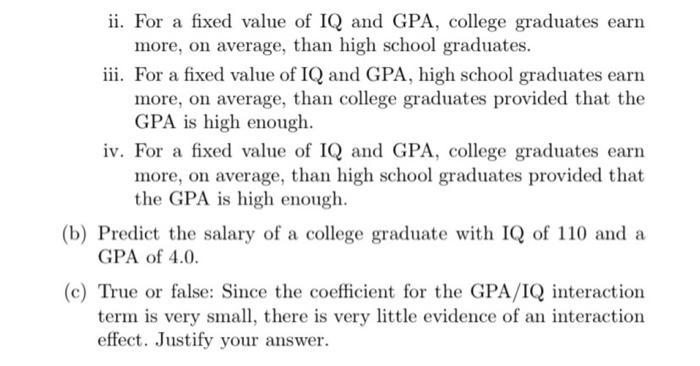Answered step by step
Verified Expert Solution
Question
1 Approved Answer
3. Suppose we have a data set with five predictors, X = GPA, X2 = IQ, X3 Level (1 for College and 0 for


3. Suppose we have a data set with five predictors, X = GPA, X2 = IQ, X3 Level (1 for College and 0 for High School), X4 = Interac- tion between GPA and IQ, and X5 = Interaction between GPA and Level. The response is starting salary after graduation (in thousands of dollars). Suppose we use least squares to fit the model, and get Bo = 50, 8= 20, 32 = 0.07,83 = 35, 34 = 0.01, 85= -10. = (a) Which answer is correct, and why? i. For a fixed value of IQ and GPA, high school graduates earn more, on average, than college graduates. ii. For a fixed value of IQ and GPA, college graduates earn more, on average, than high school graduates. iii. For a fixed value of IQ and GPA, high school graduates earn more, on average, than college graduates provided that the GPA is high enough. iv. For a fixed value of IQ and GPA, college graduates earn more, on average, than high school graduates provided that the GPA is high enough. (b) Predict the salary of a college graduate with IQ of 110 and a GPA of 4.0. (c) True or false: Since the coefficient for the GPA/IQ interaction term is very small, there is very little evidence of an interaction effect. Justify your answer.
Step by Step Solution
★★★★★
3.48 Rating (158 Votes )
There are 3 Steps involved in it
Step: 1
a The answer is ii For a fixed value of IQ and GPA college graduates earn more on average than high ...
Get Instant Access to Expert-Tailored Solutions
See step-by-step solutions with expert insights and AI powered tools for academic success
Step: 2

Step: 3

Ace Your Homework with AI
Get the answers you need in no time with our AI-driven, step-by-step assistance
Get Started


